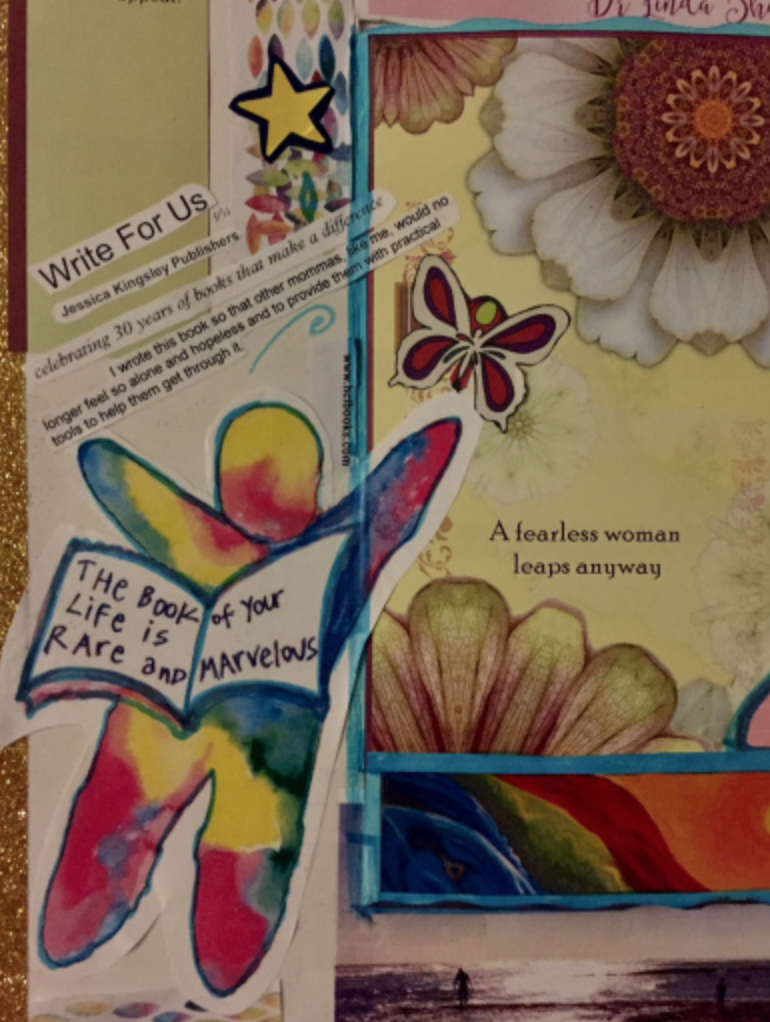When I work with clients recovering from eating disorders, part of the work is identifying and challenging the voice of the Eating Disorder (sometimes called “ED”). And then the work is to develop a new “Recovery voice,” one that has rainbow (instead of black and white) thinking.
This “Recovery voice” is both compassionate and fierce. It can call your eating disorder on its shit and have compassion for the part of you that is struggling.
Though I recovered from the eating disorder I had twenty years ago, I still have an “ED-like” voice that shows up as a critic. This voice has many black-and-white, non evidence-based directives. Here below are some of the obstacles the critical voice said while writing my book. (Exciting news: it was just accepted by Jessica Kingsley Publishers!)
Following what the Critic said are the challenges that helped lovingly guide me through obstacles. Feel free to try this journal exercise dialogue-ing between the parts of yourself and see what emerges for you.
Critic : You should do it alone.
Fiercely Compassionate Voice:
(The short version): Why?
(The long version): It’s easier with help, honey. Every hard thing you have ever done – recovery, graduate school, writing the dissertation, passing your licensure exams, marriage, having a baby, postpartum – has been done with help and support. Ask your community to help you with this. You do not have to do this alone!
(Note: If your critic says, “I don’t have a community,” that’s not true. Do you go to work, church, yoga, dance, music events, your child’s school? Do you have recovery friends and/or colleagues? Are you in a support group? Do you have a therapist? Do you know other writers? Pay attention to where you go and who you see every day. There’s your community. Join them. If you don’t have a community, ask people who have one how they connected into one.)
Critic: Don’t share about it until it is perfect or done.
Fiercely Compassionate Voice:
How do you feel when someone else shares about being in-process with something? Do you feel judgmental and shaming toward them? Of course not. You feel excited, empathic, and wanting to help. Just like when you are watching a movie, you know the main character will encounter obstacles, and you are rooting for them. You are on the journey with them. You want them to cultivate resilience through the hardships they encounter. You want the movie to end well.
Share about your visions and the obstacles you encounter along the way. The people who cheer you on are your tribe. Cheer them on, too. Those are your people. Keep them close. Share your “movie writing” with them and support them in theirs.
Oh, and, as your little one often repeats back to you, “There is no perfect, mama.”
Critic: The writing process should occur daily. At the same time. In a perfect leather chair (or, if in the bay area, a vegan version of leather). At the perfect desk. With a perfect cup of tea.
Alone. (Did I mention that already? Because if I haven’t, you should definitely be doing this alone. I know you are a mom with children hanging off of you most of the time. But you should still have this perfect alone-place.)
Fiercely Compassionate Voice:
First of all, you don’t really like tea, honey. If you don’t like something, you don’t have to drink it. And you could write daily, but you don’t have to. Write when you can, where it works in your life. If you are a mom with a toddler that only goes to sleep at nap time in a moving car, write in your car (once you pull over, of course)! You “should” (change all shoulds to coulds) write where and when and how it works for you. Maybe it will be twice a week. Maybe it will be every day. Maybe it will be different on different weeks, depending on the rest of your life. Flexibility and the slow, consistent, practice of showing up are much more sustainable than Rigid Must-Look-Like-This plans.
Critic: This should be done and published in 1 year.
Fiercely Compassionate Voice:
Remember your “Birth Plan” for Labor and Delivery? Remember how you told the baby how and when it was supposed to come out? And, in response, that baby clung to your womb like it was was going to stay there forever? And then the baby came out in exactly the way and time that was right for the baby? That’s the process here. The baby (book) will be done when it is done. Your job is to show up for the writing, and surrender the results. Be Anne LaMott and write lots of “shitty first drafts.” Be Dory finding her way home through the unknown: Just keep swimming. You don’t get to decide when this baby (book) comes out, and in what way. Your job is to make the baby (book). Write.
In Conclusion,
This “ED” critical voice, though annoying, is actually a great teacher. Just like my eating disorder twenty years ago gave me an opportunity to grow in ways I might otherwise have not, this critical voice lets me know when I am suffering and need to write. How do I know this? Because when I don’t write, the critic gets louder and when I do write, the critic becomes silent.Isn’t that interesting?
As a friend of mine loves to say “What’s in the way IS the way.”
What do you notice about your ED or critical voice? What emerges when you talk back with fierce compassion? What else helps you challenge it? What visions are you working toward?
May you keep swimming, keep surrendering the results, and keep traveling through the obstacles toward your happily (good-enough) ever after.








